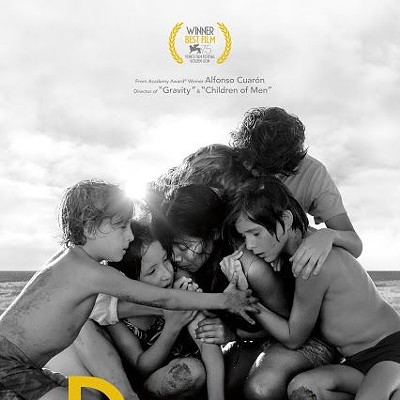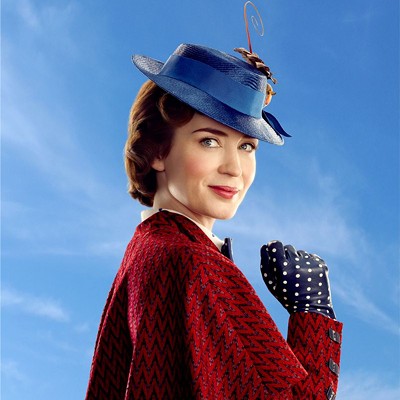3:10 To Yuma ***
3:10 to Yuma proves to be a rarity among remakes. It doesn’t slavishly copy the original, nor does it update it for modern times. It’s respectful of its predecessor, and when it does make changes from the existing template, they aren’t preposterous or pandering -- rather, they merely take another logical path than the one employed in the previous version. Based on a short story by Elmore Leonard, the 1957 3:10 to Yuma retains its status as a solid Western, typical of the psychologically rooted oaters that emerged in force during that decade. Adding roughly a half-hour to the original’s 92-minute running time, the new take, directed by Walk the Line’s James Mangold, includes more characters and more action sequences, but it takes care not to water down the battle of wills between its two leading characters.
In Glenn Ford’s old role, Russell Crowe plays Ben Wade, a notorious outlaw who’s finally captured by the authorities and scheduled to be transferred via train to the prison in Yuma, Arizona. Dan Evans (Christian Bale in the Van Heflin part) is a rancher by nature -- he’s so mild-mannered that his own wife (Gretchen Mol) and son (Logan Lerman) are often disappointed in him -- but because he’s about to lose his home and cattle, he agrees to help transport Wade for $200. Yet while Wade may appear to be the captive, he’s in many ways the one in charge, charming Dan’s family, killing the armed escorts who rub him the wrong way, and keeping Dan on edge with his taunts and bribes.
Crowe pours on his bad-boy charisma as Ben Wade, milking it for maximum effect, while Bale embodies the noblest traits that can possibly be found in such a disreputable arena as the Old West. The strong supporting cast is headed up by Peter Fonda as Byron McElroy, a leathery bounty hunter whose past assignments (including the massacre of Native American women and children) qualifies him as one sleazy rider.
Superbad**1/2
The kids are alright in Superbad; it’s the adults who prove to be a drag. Coming from some of the same talents involved with The 40-Year-Old Virgin and Knocked Up, this can’t match the impact of its predecessors, despite its best intentions to (slightly) set itself apart in the “teen sex comedy” genre. The movie begins promisingly, as longtime best friends Seth and Evan (Jonah Hill and Michael Cera, both perfectly cast) hope to spend their last couple of months in high school attending cool parties and dating hot girls. With their ultra-geeky pal Fogell (Christopher Mintz-Plasse) along for the ride, the boys hope to score some alcohol to bring to a major bash. Using Fogell’s fake ID (on which he’s identified as a 25-year-old simply named McLovin), they set out across town on their holy quest, a mission that turns sour after a robbery spoils their plans and separates Fogell from his pals. Potty-mouthed but true to its milieu, Superbad hums along until two cops (played by co-writer Seth Rogen and Saturday Night Live’s Bill Hader) come along to spoil the fun. Tiresome characters, they steer the picture away from its mother lode of comic material, and rather than disappear after making their mark, the pair hang around for the remainder of the film. Superbad gets back on track in the late innings, and it’s here that the movie’s true theme -- the fierce and touching bond that can establish itself between two boys suffering the slings and arrows of outrageous high school shenanigans -- becomes most pronounced. So whenever it centers on its teenage characters, Superbad is a likable coming-of-age comedy; whenever it focuses on the tedious antics of the cops, it turns into a bad SNL skit.
Mr. Bean's Holiday**
By borrowing from Jacques Tati, Jerry Lewis and silent-cinema icons like Buster Keaton and Charlie Chaplin, Rowan Atkinson managed to concoct his own singularly unique comic creation in the bumbling Mr. Bean. It’s just a shame that the actor has yet to find a feature film to do his character justice. Mr. Bean’s Holiday has some amusing moments scattered throughout (check out his introduction to a seafood platter), but they’re not enough to sustain an entire picture. That the plot is completely disposable (Bean wins a trip to the south of France but has trouble reaching his destination) shouldn’t matter -- after all, the Tim Burton gem Pee-wee’s Big Adventure wasn’t about anything more than a guy looking for a bicycle -- but for a skeletal framework to properly function, the gags need to be as complex as the story is thin (for prime examples, rent Tati’s masterpieces Playtime and Mon Oncle). But inspiration runs dry long before the film reaches its Cannes-set climax, though cineasts will take pleasure in this portion’s tweaking of pretentious art-house twaddle. Now whether the small kids who are taken to this G-rated confection view this segment with anything other than boredom remains to be seen.
The Nanny Diaries **1/2
Writer-directors Shari Springer Berman and Robert Pulcini, the team behind 2003’s American Splendor, have now returned with an adaptation of The Nanny Diaries, the best-selling (and hotly debated) novel by Emma McLaughlin and Nicola Kraus. As before, Berman and Pulcini attempt to embellish their tale with all manner of visual flourishes and eccentric details, but working from a blueprint that doesn’t always lend itself to such touches, the results are more heavy-handed than before. That’s not to say that this doesn’t offer several rewards of its own making, starting with the strong performances by Scarlett Johansson and Laura Linney. Johansson plays Annie Braddock, a college graduate who, wary of the demands of a career in high finance, ends up landing what she believes will be a less stressful gig as a nanny for a wealthy Manhattan couple known as Mr. and Mrs. X (Paul Giamatti and Linney). Her young charge, Grayer (Nicholas Art), proves difficult at first but over time softens toward Annie, who’s merely the latest in a long line of nannies. A spiritual companion to The Devil Wears Prada (Nanny preceded Prada in print by one year, and in the film, Mrs. X can be glimpsed reading the fashion industry tell-all), this offers some nicely staged sequences to help gloss over the broad characterizations.
Rush Hour 3 *
Thoughts of Max von Sydow have been commanding much of my time these last two weeks. First, the recent death of the legendary Ingmar Bergman brought to mind many of the director’s classics, several of which he made with von Sydow (the pair had a working relationship similar to Ford-Wayne, Kurosawa-Mifune and Scorsese-De Niro). Then there’s the recent DVD release of Flash Gordon, with von Sydow cast as the villainous Emperor Ming. And now there’s Rush Hour 3, which casts the great Swedish actor in a supporting role (narratively, no different than the part he essayed in Minority Report). Exactly 50 years ago, Von Sydow was exploring philosophical issues of life and death in Bergman’s masterpiece The Seventh Seal; now, he’s shunted to the background to make room for the increasingly unfunny antics of Chris Tucker. If there’s a more depressing commentary to be made on the current state of cinema, I can’t imagine what it might be.
The Bourne Ultimatum ***
The third time’s the charm with The Bourne Ultimatum, the best in the series of films based on the popular novels by the late Robert Ludlum. Matt Damon, suitably taciturn even though he’s still too young for the role, again stars as Jason Bourne, the former CIA assassin whose continuing bout of amnesia regarding his past perpetually keeps him searching for the truth, even as his agency handlers seek to have him terminated. Taking over villainous duties from Chris Cooper and Brian Cox is David Strathairn, cast as the latest government suit hoping to protect his own nefarious interests by taking out Bourne. The reactions of Strathairn’s character to constantly being outsmarted by Bourne are priceless and provide the film with its brief flashes of humor. And adding some much needed humanity to the proceedings are Joan Allen and Julia Stiles, returning to their roles as CIA operatives of different ranks. Paul Greengrass, returning to the series after taking time off to earn a Best Director Oscar nomination for United 93, tops himself with action set pieces that prove to be more exciting than those on display in his Supremacy or Identity. One of the lengthy chase scenes is especially impressive, and makes one wonder if Damon elected to forego a straight salary in order to be paid by the kilometer.
Becoming Jane **1/2
Perfectly pleasant yet also somewhat pointless, Becoming Jane comes across less as a motion picture and more as a victim of identity theft. Given the glut of exemplary films based on the works of Austen -- from the fairly faithful (Sense and Sensibility, Pride and Prejudice) to the radically reworked (Bridget Jones’s Diary, Clueless) -- the only sound reasons to create a movie based on Jane herself would be either to suggest some insights into what turned this country girl into one of the most acclaimed writers in the English language or to provide a comprehensive overview of her life and times. But Becoming Jane prefers to take a more narrow view, focusing on one small period in her life (and, based on historical records, a spotty one at that) and trumping up the details of her brief flirtation with a dashing rogue named Tom Lefroy, who would later become Lord High Justice of Ireland. Anne Hathaway, all-American in The Devil Wears Prada and Brokeback Mountain, adopts a British accent (shades of Renee Zellweger tackling Bridget Jones) and makes for a lively Jane (even if, physically, she more resembles Austen’s contemporary, Lady Caroline Lamb).
The Simpsons Movie ***1/2
Crafting a motion picture from a current television series that’s been around for nearly two decades is a dicey proposition, but The Simpsons Movie fills the larger dimensions of the theater screen quite nicely. Running the length of four combined episodes, this flick takes Homer’s weekly display of idiocy to a new level, as his bumbling disrespect for the environment leads to Springfield being blocked off from the rest of the world by a giant dome, with the town’s destruction the ultimate goal of the overzealous head of the Environmental Protection Agency (voiced by Albert Brooks, billed in the credits as “A. Brooks”). Knowing that Homer is the culprit, the town’s residents soon come a-calling with torches in hand and nooses hanging from nearby trees (baby Maggie’s rope has a little pacifier attached). But if there’s one area in which Hollywood remains blissfully, even blessedly, optimistic, it’s in the strength of the family unit, and as long as Homer, Marge, Bart, Lisa and Maggie stick together, they can lick any and all odds.
Hairspray ***1/2
One of this summer’s few out-and-out delights, smoothing out but never compromising the issues that made John Waters’ original film such a quirky delight. An ode to being different, Hairspray stars delightful newcomer Nikki Blonsky as Tracy Turnblad, an overweight teenager who won’t let her pleasantly plump figure get in the way of following her dream in 1960s Baltimore. And her dream is to become famous, preferably by showing off her dance moves on The Corny Collins Show, a local American Bandstand-style program that’s a hit with the kids. Her obese mom Edna (John Travolta in drag) is afraid her daughter will get hurt, but her dad Wilbur (a warm Christopher Walken) encourages her to go for it. Impressing Corny Collins himself (X-Men’s James Marsden), not to mention the show’s reigning pinup star Link Larkin (Zac Efron), Tracy does indeed land a coveted spot on the show, much to the disgust of Link’s girlfriend Amber Von Tussle (Brittany Snow) and her wicked mom Velma (Michelle Pfeiffer). Compounding the tension is that Tracy has become friends with the blacks who are allowed to perform on the program once a month (on “Negro Day”), an open-minded attitude that infuriates the racist Velma to no end. The film’s hot-topic issues are all presented in the realm of feel-good fantasy, meaning that reality has no place in this particular picture. But that’s not to say the movie is insincere in its intentions, and when Tracy and “Negro Day” host Motormouth Maybelle (Queen Latifah) lead a march promoting “Integration, Not Segregation,” it’s hard not to get swept up in the emotionalism of the piece. Yet the movie’s first and foremost a musical, and director Adam Shankman does a commendable job of filming the song-and-dance routines in a manner that accentuates the total skills involved (the noticeable lack of rapid MTV-style cuts is greatly appreciated). All of the principals are allowed to belt out at least one number apiece, and their enthusiasm and energy is positively infectious. The weakest cast link is, perhaps surprisingly, Travolta, who may have enjoyed returning to his movie musical roots (Saturday Night Fever, Grease) but nevertheless fails to adequately fill the large shoes of the late Divine, who was simply, well, divine in Waters’ ‘88 screen version. (Harvey Fierstein, a more logical choice than Travolta, played the part on Broadway.) As for John Waters, he stuck around to make sure that the circle’s complete. Look for him in a split-second cameo at the beginning of the film: He’s the pervert who flashes a trio of housewives on the street.
Harry Potter and the Order of the Phoenix ***
Those who like their Potter black will find much to appreciate in Harry Potter and the Order of the Phoenix, the fifth and moodiest of the J.K. Rowling adaptations to date. Chris Columbus’ first two entries -- both underrated -- focused mainly on fun and games, with the subsequent installments helmed by Alfonso Cuaron and Mike Newell taking on decidedly darker dimensions. The level of malevolence is raised even further here, thanks to the taut direction by unknown David Yates and a forceful performance by series lead Daniel Radcliffe. With only one to two years separating each Potter flick, it’s been easy to spot the relative growth of Radcliffe (as well as costars Rupert Grint and Emma Watson) as he sprouted from wide-eyed tyke to troubled teenager. Yet between the last film (Goblet of Fire) and this new one, it’s startling to note how the actor and the character seem to have aged multiple years, a testament to the maturity and intensity that Radcliffe brings to the role. Villainy abounds in The Order of the Phoenix, with Lord Voldemort (Ralph Fiennes) haunting Harry’s every move, a fluttering fascist named Dolores Umbridge (Imelda Staunton) taking over the Hogwarts school, and an escaped prisoner known as Bellatrix Lestrange (Helena Bonham Carter) arriving late to kill off a popular character. Add to those threats Harry’s issues of abandonment and estrangement, and it’s no wonder the lad can’t keep those roiling emotions in check. In this respect, Phoenix operates not only as a story-specific fantasy flick but also as a universal teen angst tale, a far-flung Rebel Without a Cause in which the protagonist tries to comprehend the adult world he’s on the verge of entering while simultaneously struggling to cut the umbilical cord of childhood. Because of this slant, this emerges as the most dramatic of the five films to date. 

























